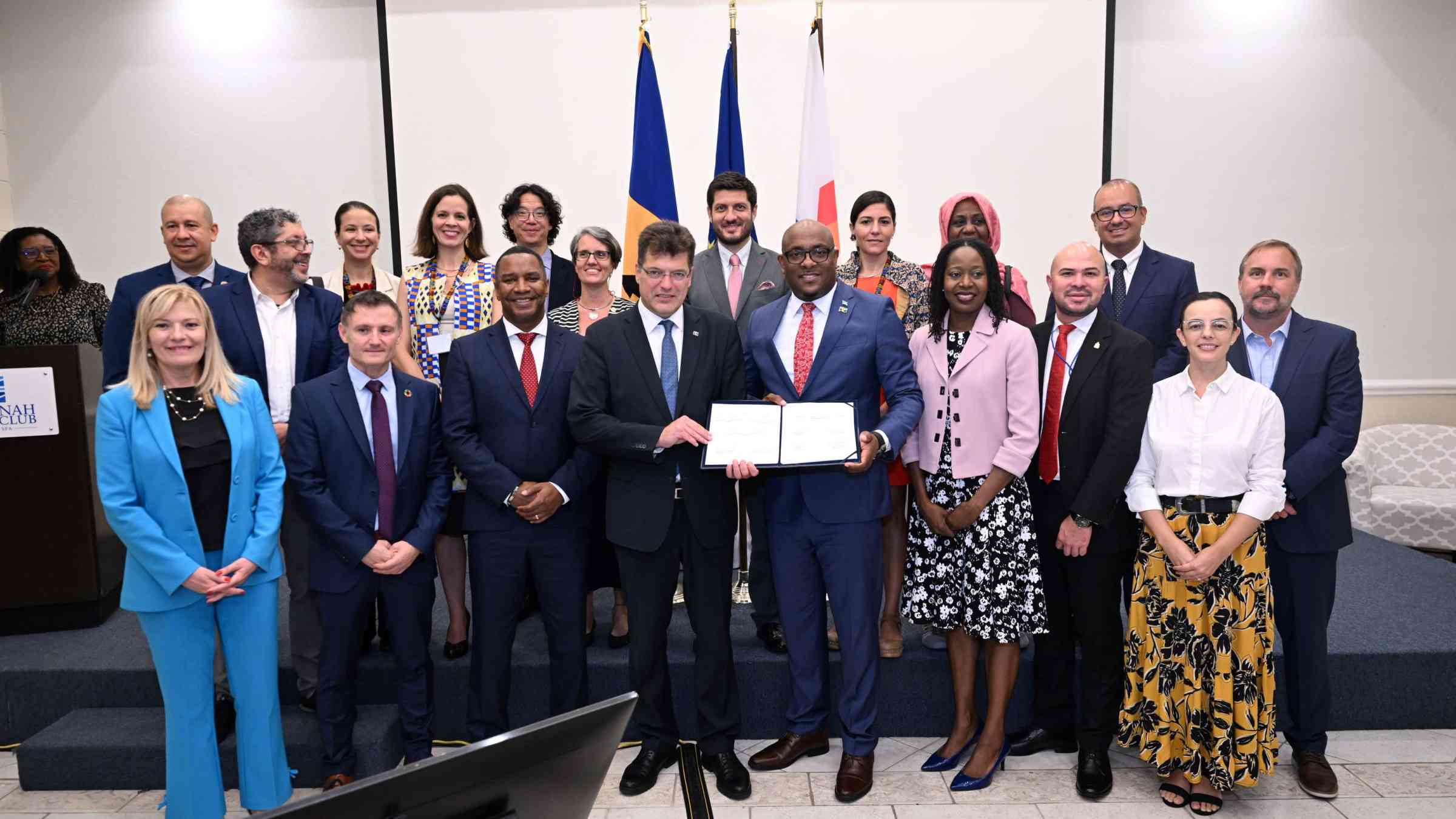Landmark regional agreement with the EU strengthens disaster risk management in Latin America and the Caribbean

Bridgetown, Barbados - As disasters know no borders and Latin America and the Caribbean grapple with increasing disaster risks, collaboration must be enhanced to foster disaster resilience and preparedness.
That is the goal of a new landmark agreement on enhancing cooperation on integrated disaster risk management that was signed between the European Union and regional and national actors on 15 May in Bridgetown, Barbados.
Development of this Memorandum of Understanding (MoU) was led by the European Commission’s Civil Protection and Humanitarian Aid Operations department (ECHO) and supported by the United Nations Office for Disaster Risk Reduction (UNDRR), which brought together governmental, intergovernmental, and non-governmental organizations for negotiations that started in 2023.
During those negotiations, the Latin America and the Caribbean region was represented by four leading Intergovernmental organisations: the Coordination Center for the Prevention of Disasters in Central America and the Dominican Republic (CEPREDENAC under SICA); the Caribbean Disaster Emergency Management Agency (CDEMA under CARICOM); the General Secretariat for the Andean Community of Nations (SGCAN); and the Meeting of Ministers and High Authorities for Integrated Risk Management (RMAGIR) of the South American Common Market (MERCOSUR). Individual countries - Chile, Cuba and Mexico - also joined as signatories to the agreement.
The parties worked to collectively define a strategic pathway that would lead to more robust international, regional and sub-regional cooperation in the area of disaster risk management, specifically around climate change adaptation, resilient infrastructure, early warning systems and private sector involvement.
Implementation of the MoU will enhance collaboration to support countries in their efforts to build whole-of-society disaster resilience, reduce disaster risks and impacts, and therefore contribute to prosperity and well-being towards a sustainable future.
The MOU supports the commitments made in the Regional Action Plan for the Implementation of the Sendai Framework for Disaster Risk Reduction in Latin America and the Caribbean. It could also serve as a platform to further the UN Secretary-General´s Early Warnings for All Initiative, which aims to achieve universal early warning coverage by 2027.
"The signing of this MoU marks a significant milestone in our collective endeavour to enhance disaster resilience in Latin America and the Caribbean. UNDRR is proud to have contributed to these efforts, supporting enhanced cooperation and preparedness measures in response to an escalating risk landscape. As we confront an intensifying frequency and severity of disasters, exacerbated by the complex interplay of climate change and socio-economic vulnerabilities, the need for concerted action has never been more pressing”, said Paola Albrito, Acting Special Representative of the United Nations Secretary-General for Disaster Risk Reduction and Director of UNDRR.
“Through the implementation of this MoU, we will not only advance the objectives outlined in the Sendai Framework for Disaster Risk Reduction but we will also lay the groundwork to help communities rebound in the aftermath of adversity. This underscores our commitment to forging a future where resilience is not merely an aspiration but a tangible reality for all”, she added.
“With specific allocations to support disaster preparedness, the EU continues its longstanding partnership with the region in this field. The signature of the new Memorandum of Understanding will further reinforce this cooperation, making Latin American and Caribbean countries better prepared and more resilient to future disasters,”said Janez Lenarčič, European Commissioner for Humanitarian Aid and Crisis Management.
Didier Trebucq, United Nations Resident Coordinator for Barbados and the Eastern Caribbean, reinforced the importance of this MoU towards sustainable development in the region: “today's agreement signifies a crucial advancement as the UN bolsters its support for Caribbean nations to withstand natural hazards and climate impacts. At the core of this MoU is our commitment to strategic partnerships and sustainable development, particularly as we anticipate a busier hurricane season. The wider UN Team in the Caribbean is dedicated to enhancing climate resilience and disaster preparedness through comprehensive risk management, climate adaptation, and resilient infrastructure initiatives. This effort is pivotal in our mission to accelerate the implementation of the SDGs and ensure inclusivity."
This joint initiative comes at a critical time, with Latin America and the Caribbean facing increasing disaster risks from natural and man-made hazards. Recent events such as the COVID-19 pandemic, volcanic eruptions, earthquakes, hurricanes, and forest fires underscored the urgent need for coordinated action to address the region's vulnerability.
“This MoU reflects the continued commitment of the European Union to supporting resilience building to the diverse hazards facing the Caribbean region. It also takes into consideration the realities of the amplification of the hazard impacts by climate change. We at CDEMA are looking forward to the additional opportunities that the MoU will provide because it offers a well-defined space for us to collaborate with our Latin American and South American colleagues through the international governmental organizations that operate in that space. In addition, it will provide increased opportunities for the way in which the knowledge and experience from the European Union can complement the work that we do in the region” said Executive Director of CDEMA, Elizabeth Riley. “I would also say CDEMA believes that the Caribbean region has a lot to teach the other regions because we have a lot of unique models in our space that we have developed that looks at resilience building,” she added.
The signing event brought together ministers, national authorities, high-level representatives from the EU, intergovernmental agencies, United Nations agencies, regional partners, multilateral development banks, private sector representatives, and other stakeholders, underlining the importance of coordinated regional efforts to build resilience for all.